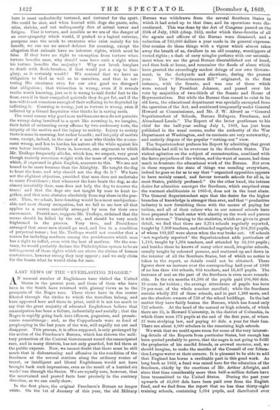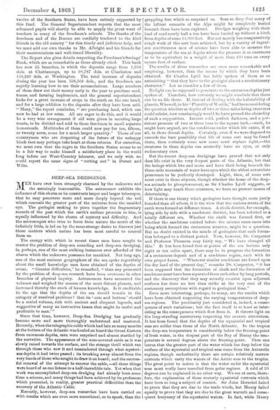LAST NEWS OF THE "EVERLASTING NI GGER."
AN unusual number of Englishmen have visited the United States in the present year, and those of them who have been in the South have returned with gloomy views as to the prospects of the Negro race. These views have in due course filtered through the circles to which the travellers belong, and have appeared here and there in print, until it is not too much to say that the great majority of educated Englishmen believe that emancipation has been a failure, industrially and socially ; that the Negro is rapidly going back into idleness, paganism, and promis- cuous concubinage ; and, as the Copperheads were so fond of prophesying in the last years of the war, will rapidly rot out and disappear. This process, it is often supposed, is only prolonged by the action of the Freedmen's Bureau, which has thrown the mili- tary protection of the Central Government round the emancipated race, and in many districts, has not only guarded, but fed them at the public expense. Now, we cannot doubt that there must be still much that is disheartening and offensive in the condition of the freedmen at the several stations along the ordinary routes of travel, or intelligent and liberal Englishmen would not have brought back such impressions, even as the result of a hurried six weeks' run through the States. We are equally sure, however, that the ascertained and proved facts bear precisely in the contrary direction, as we can easily show.
In the first place, the original Freedmen's Bureau no longer exists. On the 1st of January of this year, the old Military Bureau was withdrawn from the several Southern States in which it had acted up to that time, and its operations were dis- continued. This was done by the Act of Congress passed on the 25th of July, 1868 (chap. 245), under which three-fourths of all the agents and officers of the Bureau were dismissed, and a reduction of 760,000 dollars a year made in its general expenses.
Our cousins do these things with a vigour which almost takes away the breath of us, dwellers in an old country, worshippers of
vested rights ; a dash of envy mingles perforce with our astonish- ment when we see the great Bureau disestablished out of hand, and then look at home, and remember the floods of abuse which have greeted the exceedingly modest doings of our own Govern- ment, in the dockyards and elsewhere, during the present year. This " Discontinuance Bill " originated, in the first instance, with the Senate, and was one of those which were vetoed by President Johnson, and passed over his veto by majorities of two-thirds of the Senate and House of Representatives. But while the Bureau thus ceased to exist in its old form, the educational department was specially exempted from the operation of the Act, and continued temporarily under General Howard as Commissioner, and Mr. J. W. Alvord as " General Superintendent of Schools, Bureau Refugees, Freedmen, and Abandoned Lands." The Report of the latter gentleman to his chief for the half-year ending July 1, 1869, has just been published in the usual course, under the authority of the War Department at Washington, and its contents are very noteworthy, and entirely dispose of the popular " rotting-out " view.
The Superintendent prefaces his Report by admitting that great difficulties had still to be overcome in the Southern States. The violent agitation on the subject of reconstruction, combined with the fierce prejudices of the whites, and the want of means, had done much to frustrate the educational work of the Bureau. But even in these respects the state of things was mending everywhere, indeed he goes so far as to say that " organized opposition appears to have mainly ceased, and favour towards schools for all is, in most States, publicly professed." On the other hand, the intense desire for education amongst the freedmen, which surprised even the warmest abolitionists in 1865-6, does not in the least abate. The General Superintendent says that the desire for the higher branches of knowledge is stronger than ever, and that " productive industry is now furnishing them with the means of paying for tuition, and all of their colour who in our normal schools have been prepared to teach enter with alacrity on the work and pursue it with success." Turning to the statistics, which are given in great detail, we find that there are 3,314 schools regularly reported, taught by 7,909 teachers, and attended regularly by 204,253 pupils, of whom 192,227 were slaves when the war broke out. Of schools ' not regularly reported' the Superintendent adds particulars of 1,110, taught by 1,594 teachers, and attended by 52,100 pupils ; and besides these he knows of many other small, irregular schools, usually taught by coloured persons, and scattered up and down in the interior of all the Southern States, but of which no notice is taken in the report, as details could not be obtained. These figures show an increase over the corresponding half-year of 1868 of no less than 444 schools, 855 teachers, and 16,407 pupils. The increase of zeal on the part of the freedmen is even more remark- able. In the six months 44,386 of the pupils paid 106,866 dole. 19 cents. for tuition ; the average attendance of pupils has been 78 per cent. of the whole number enrolled ; while the freedmen sustain wholly 292 of these schools, and in part 1,289 more, and are the absolute owners of 759 of the school buildings. In the last matter they have fairly beaten the Bureau, which has found only 722 schools. At the head of the normal or high schools, of which there are 25, is Howard University, in the district of Columbia, in which there were 172 pupils at the end of the first year, of whom 21 were studying law, and paying 40 dols. a year for their fees. There are about 4,000 scholars in the remaining high schools.
We wish that we could spare room for some of the very interest- ing details of the. Reports from particular States, but enough has been quoted probably to prove, that the negro is not going to fulfil the prophecies of his candid friends, or avowed enemies, and, we should imagine, to make the mouths of the Council of our Educa- tion League water at their corners. It is pleasant to be able to add that England has borne a creditable part in this good work. As long back as 1862, a fund was raised here for the education of the freedmen, chiefly by the exertions of Mr. Arthur Albright, and since that time considerably more than half-a-million dollars have been transmitted to the United States. During the past year upwards of 45,000 dols. have been paid over from the English fund, and we find from the report that no leas than thirty-eight training schools, containing 1,054 pupils, and distributed over
twelve of the Southern States, have been entirely supported by this fund. The General Superintendent reports that the most advanced pupils will shortly be able to supply the great want of teachers in many of the freedmen's schools. The thanks of the freedmen and of the Bureau are cordially tendered to the kind friends in the old country " for this timely and judicious help, and we must add our own thanks to Mr. Albright and his friends for their unostentatious and well-timed liberality.
The Report also gives details respecting the Freedmen's Savings' Bank, which are as remarkable as those already cited. This bank has now 25 branches, in which the deposits range from 1,958 dole. at Chattanooga, up to 98,787 dole. at Charleston and 148,249 dols. at Washington. The total increase of deposits during the year has been 558,568 dols., and the freedmen are rapidly learning how to use their accumulations. Large numbers of them draw out their money early in the year to purchase seed, teams, and farming implements, and the general superintendent looks for a great increase of crops in the south on the one hand, and for a large addition to the deposits after they have been sold. "Many," the report concludes, " are purchasing land, which can now be had at low rates. All are eager to do this, and it would be a very wise arrangement if aid were given in securing large tracts, to be divided and sold to these freedmen in small separate homesteads. Multitudes of them could now pay for ten, fifteen, or twenty acres, some for a much larger quantity." Those of our countrymen who are despairing of the future of the unhappy black race may perhaps take heart at these returns. For ourselves, we must own that the negro in the Southern States seems to us in a fair way to make himself a satisfactory place in the world long before our West-Country labourer, and we only wish we could report the same signs of " rotting out " in Dorset and Wilts.



































 Previous page
Previous page